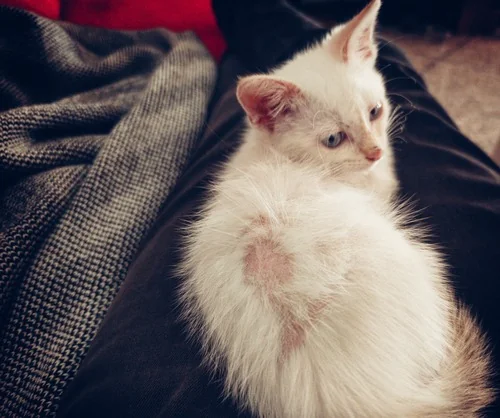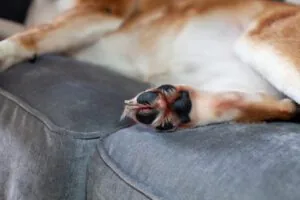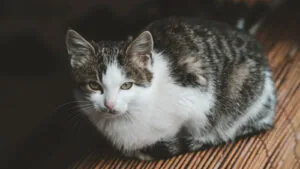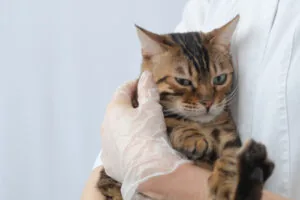Why Is My Cat Losing Hair?

Discovering that your cat is losing hair can be concerning for any pet owner. This blog aims to discuss the various reasons behind hair loss in cats and emphasize the importance of professional veterinary care. While it’s natural to look for answers online, remember that an accurate diagnosis and treatment plan can only come from a veterinarian. If your cat is experiencing hair loss, call Dyer Animal Clinic at (219) 865-3737 to schedule an appointment. Let’s explore the common causes of hair loss in cats and understand when it’s time to seek help.
Understanding Hair Loss in Cats
Hair loss in cats, also known as alopecia, can occur for many reasons, ranging from simple and benign to more serious underlying health issues. Alopecia in cats can be partial or complete and can occur anywhere on the body. The skin surrounding the area of hair loss can appear normal or it might have redness, bumps, scabs, and skin loss.
Common Causes of Hair Loss
- Allergies: One of the most common causes of hair loss in cats is allergies. Allergies can be to food, environmental factors, or flea bites. Cats with allergies might also exhibit symptoms like itching, redness, and discomfort.
- Parasites: External parasites such as fleas, mites, and lice can lead to hair loss due to the intense itching and scratching they cause. Regular preventative treatments are key to avoiding these unwelcome guests.
- Hormonal Imbalances: Conditions like hyperthyroidism or hormonal imbalances can lead to hair loss. These conditions often require medical intervention and ongoing management.
- Stress and Anxiety: Cats can lose hair due to over-grooming, which is often a response to stress or anxiety. Identifying and addressing the source of stress is crucial for your cat’s health.
- Skin Infections and Conditions: Fungal infections, such as ringworm, or bacterial infections can cause hair loss. These require medical treatment to resolve.
Signs It’s Time to See a Vet
If your cat is losing hair, it’s essential to observe other symptoms they might be exhibiting. These could include changes in appetite, unusual scratching or grooming, lethargy, or any signs of discomfort. Early intervention can make a significant difference in your cat’s health and well-being.
Diagnosing Hair Loss in Cats
A thorough examination by a veterinarian is necessary to diagnose the cause of hair loss. This may include a detailed history, physical examination, skin scrapings, allergy testing, blood work, or a biopsy. Your vet will conduct a comprehensive examination of your cat’s hair and skin, looking for any signs of infections, parasites, or other skin conditions. Depending on the initial findings, your vet may recommend further diagnostic tests to pinpoint the exact cause of hair loss.
Treatment and Management
The treatment for hair loss in cats depends on the underlying cause. It may involve medication, dietary changes, parasite control, or management of an underlying disease. Regular follow-ups with your vet will be necessary to monitor your cat’s progress and make any adjustments to the treatment plan as needed. Preventative care is also essential in avoiding future episodes of hair loss.
Preventing Hair Loss in Cats
Preventing hair loss in cats involves several proactive steps aimed at maintaining their overall health and well-being. While it’s not possible to prevent every cause of hair loss, there are measures you can take to minimize the risk and ensure your cat lives a happy, healthy life.
- Balanced Nutrition: Feeding your cat a balanced diet rich in essential nutrients, vitamins, and minerals is fundamental. A proper diet supports skin and coat health, reducing the likelihood of hair loss due to nutritional deficiencies. Consider consulting your veterinarian to choose the best diet for your cat’s specific needs.
- Regular Grooming: Regular grooming helps keep your cat’s coat in good condition and allows you to spot any early signs of skin problems or parasites that could lead to hair loss. Brushing your cat not only removes loose hair and tangles but also distributes natural oils throughout their coat, promoting skin health.
- Parasite Prevention: Staying on top of parasite prevention is crucial. Fleas, ticks, and mites can cause severe itching and scratching, leading to hair loss. Use vet-recommended flea and tick preventatives year-round to protect your cat from these pests.
- Stress Reduction: Cats are sensitive creatures, and stress can lead to over-grooming and subsequent hair loss. Create a comfortable, secure environment for your cat by providing safe hiding spots, engaging toys, and regular playtime. Pay attention to any changes in your cat’s environment or routine that may cause stress and try to minimize these disruptions.
- Regular Veterinary Check-ups: Routine vet visits are vital in preventing and detecting early signs of conditions that could lead to hair loss. Your vet can offer personalized advice on diet, grooming, and stress management based on your cat’s health status and lifestyle. These check-ups also provide an opportunity to update vaccinations and perform routine parasite control.
Contact Dyer Animal Clinic Today!
Caring for a cat experiencing hair loss requires understanding and patience. Identifying the cause is the first step toward providing the right treatment and returning your cat to health. At Dyer Animal Clinic, we’re here to support you every step of the way. If you’re concerned about hair loss or any other health issues, please call us at (219) 865-3737 to make an appointment.
Share This Post
Recent Posts
About Dyer Animal Clinic
We are a place where pets and their people can feel at home. It's a place where wellness is maintained and supported from the time they’re newborns through their golden years.






